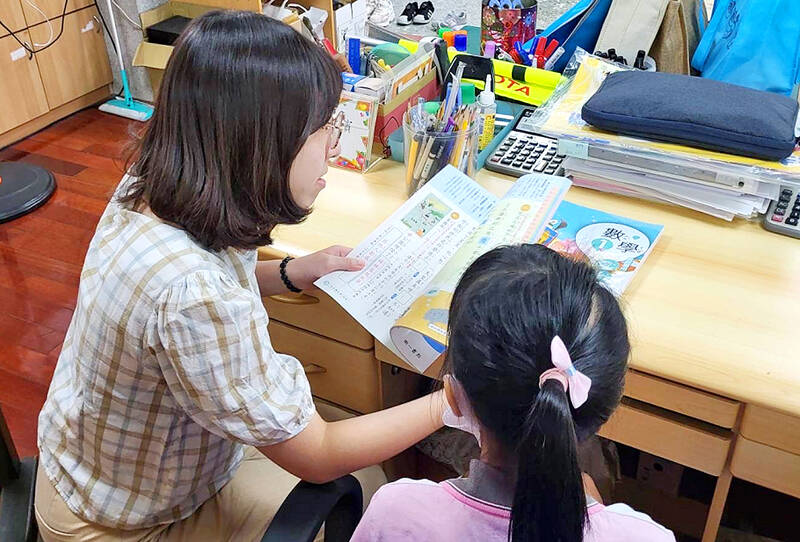China Development Foundation is promoting the “Heritage 100 x Tutoring 100” Program to financially assist outstanding college students and encourage them to become tutors for economically disadvantaged schoolchildren in Taiwan. This program has supported over 1,700 students in the past 17 years. Recently, the foundation held an online volunteering workshop, where this year’s 100 scholarship recipients pledged to work together with love, patience, and tolerance to assist schoolchildren for 100 hours of tutoring sessions.
The “Heritage 100 x Tutoring 100” Program was established with the strong support of Angelo J. Y. Koo, the chairman of the China Development Foundation, to encourage college students to accompany disadvantaged schoolchildren in their growth. Volunteers who share similar backgrounds with the disadvantaged children can provide timely assistance and understand their needs. Since its implementation, a total of NT$84 million has been invested, and about 1,700 college students have participated in the volunteering program, benefiting more than 1,700 schoolchildren and families.
Luo, a student at the graduate school of Chung Cheng University, has received the scholarship for five consecutive years due to her outstanding performance in tutoring. One day, Luo met a younger student whom she had tutored before. The little girl said, “Sister, you used to remind me to concentrate on my studies and do my homework obediently after class. I have done it all now!” This simple sentence deeply moved Luo. She said that through interacting with the students, she has developed empathy and learned to think from their perspectives. Another student named Dai, who has just received a scholarship for the first time at Taipei University, is looking forward to becoming a volunteer tutor. “Looking back on my growth process, receiving help and encouragement from others gave me the courage to face the future. Now that I have the ability, I also want to be a person who gives strength to others,” Dai said.

Photo courtesy of China Development Foundation
Angelo J. Y. Koo firmly believes that “education is the best investment.” For 17 years, through this program, the volunteers have not only helped disadvantaged students improve their learning confidence but also had the opportunity to give back to society. The foundation will continue to be involved in disadvantaged education, assisting students in finding their academic direction and helping them to grow happily with the support and companionship of love. The Foundation hopes that college students who are interested in giving back will join as tutoring volunteers so that more disadvantaged children can benefit, expanding the cycle of kindness and working together to spread love and warmth.

PERSISTENT RUMORS: Nvidia’s CEO said the firm is not in talks to sell AI chips to China, but he would welcome a change in US policy barring the activity Nvidia Corp CEO Jensen Huang (黃仁勳) said his company is not in discussions to sell its Blackwell artificial intelligence (AI) chips to Chinese firms, waving off speculation it is trying to engineer a return to the world’s largest semiconductor market. Huang, who arrived in Taiwan yesterday ahead of meetings with longtime partner Taiwan Semiconductor Manufacturing Co (TSMC, 台積電), took the opportunity to clarify recent comments about the US-China AI race. The Nvidia head caused a stir in an interview this week with the Financial Times, in which he was quoted as saying “China will win” the AI race. Huang yesterday said

Japanese technology giant Softbank Group Corp said Tuesday it has sold its stake in Nvidia Corp, raising US$5.8 billion to pour into other investments. It also reported its profit nearly tripled in the first half of this fiscal year from a year earlier. Tokyo-based Softbank said it sold the stake in Silicon Vally-based Nvidia last month, a move that reflects its shift in focus to OpenAI, owner of the artificial intelligence (AI) chatbot ChatGPT. Softbank reported its profit in the April-to-September period soared to about 2.5 trillion yen (about US$13 billion). Its sales for the six month period rose 7.7 percent year-on-year

MORE WEIGHT: The national weighting was raised in one index while holding steady in two others, while several companies rose or fell in prominence MSCI Inc, a global index provider, has raised Taiwan’s weighting in one of its major indices and left the country’s weighting unchanged in two other indices after a regular index review. In a statement released on Thursday, MSCI said it has upgraded Taiwan’s weighting in the MSCI All-Country World Index by 0.02 percentage points to 2.25 percent, while maintaining the weighting in the MSCI Emerging Markets Index, the most closely watched by foreign institutional investors, at 20.46 percent. Additionally, the index provider has left Taiwan’s weighting in the MSCI All-Country Asia ex-Japan Index unchanged at 23.15 percent. The latest index adjustments are to

CRESTING WAVE: Companies are still buying in, but the shivers in the market could be the first signs that the AI wave has peaked and the collapse is upon the world Taiwan Semiconductor Manufacturing Co (TSMC, 台積電) yesterday reported a new monthly record of NT$367.47 billion (US$11.85 billion) in consolidated sales for last month thanks to global demand for artificial intelligence (AI) applications. Last month’s figure represented 16.9 percent annual growth, the slowest pace since February last year. On a monthly basis, sales rose 11 percent. Cumulative sales in the first 10 months of the year grew 33.8 percent year-on-year to NT$3.13 trillion, a record for the same period in the company’s history. However, the slowing growth in monthly sales last month highlights uncertainty over the sustainability of the AI boom even as